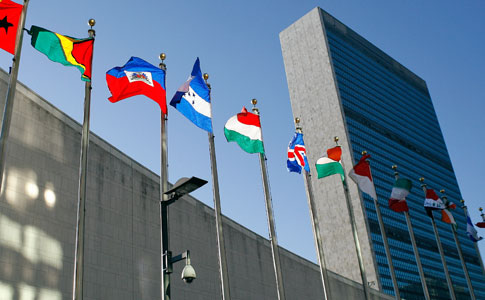NOTE: This guest post was written by Alexandra Maseko. Alexandra is a 2015 graduate of the Seton Hall School of Diplomacy and International Relations. Her specializations are in International Organizations and International Economy and Development. A native of Zimbabwe, Alexandra’s interests are the operation of international institutions and the impact of states on their efficacy. She co-wrote a previously published piece for The Independent, The Permanent Court of Undisclosed Information. Follow her on twitter @AlexandraMaseko.
Bathsheba N. Crocker, Assistant Secretary of State for International Organizations, gave a briefing on Friday September 26, the day after President Obama gave his speech to the UNGA. The event was sponsored by the Women’s Foreign Policy Group in collaboration with the Institute of International Education. The event was an intimate, off the record affair, in which the Assistant Secretary of State spoke about some of the major themes raised in the President’s UN address. Assistant Secretary Crocker addressed each of the major issues and then opened the floor for discussion to the professionally diverse audience. Below are the themes that drew primary focus during the briefing.
Containing the Outbreak of Ebola
One of the first themes to emerge in conjunction with the UNGA agenda was that of the Ebola epidemic. Crocker highlighted that the US had chaired a historic meeting in the UN exclusively to deal with Ebola. The US led meeting focused on the strengthening of health systems and strategies for improving the resilience of people in affected areas. The meeting, occurring at a crucial time when the UN was criticized for not doing enough to curb the outbreak remains a flagship achievement. “It is right to criticize the UN but also imperative to let it redeem itself and to make adjustments,” explained Assistant Secretary Crocker, saying such adjustments were necessary not just with regards to Ebola but terrorism and climate change as well.
When asked what the US was doing to contain the outbreak, Ms. Crocker highlighted the US stepping up with a large financial contribution. US funding to address Ebola reinforces policy attention but also signifies that the US expects other international collaborators. Global collaboration was emphasized as an integral component to successfully contain the outbreak.
ISIL and US Strategy
Counter-terrorism and the US strategy on targeting ISIL received much attention. In his address to the United Nations General Assembly President Obama called the international community to action on dealing with extremism presented by ISIL. Assistant Secretary Crocker elaborated on the UN resolution and its correlation to US priorities. This approach was heralded by some of the participants as comprehensive in addressing the previously overlooked components of extremist recruitment. Publicizing statements from religious organizations and civil society rejecting extremist behavior were recommended as influential in countering radicalism. However, the recognition that a resolution alone will not resolve this challenge was made clear by the State Department.
The Resilience of Climate Change
Throughout Assistant Secretary Crocker’s talk, the theme of resilience persisted, be it in policy implementation or policy design as was the case for the climate change discussion. Similar to the response for ISIL and Ebola, a strong global response was called for around climate change. Consistency in framing US priorities in the collective action forums is continually being practiced by the State Department, as Secretary Kerry recently did when speaking at an event in which he too pushed for climate change.
Peacekeeping Reforms
Within the UN, peacekeeping reform is an issue that has incited much conversation. Assistant Secretary Crocker spent a moment talking about the efforts the UN is making in investigating how to enhance peacekeeping, the results of which can be found in the Secretary General’s Peacekeeping Review. She highlighted some of the more contemporary predicaments that are faced such as the need to deal with much more politically sensitive questions and situations today than in the past as well as effective ways for mobilizing the resources to support peacekeeping operations. To address some of the discrepancies and inconsistencies faced by Troop Contributing Countries (TCC’s) and Finance Contributing Countries (FCC’s) Assistant Secretary Crocker indicated that instead of the UN dealing with peacekeeping itself, outside experts will be consulted and will convene- a formula expected to be important considering the ominous threat of ISIL.
Keeping the UN as a Vital Component of Today’s Global Architecture.
The UN remains as the only set of global organizations that bring the globe together to deal with problems. Although forced to deal with conflicting views, the UN has done fairly well in coming together on the issue of counter terrorism. States were more or less in support and generally not dissenting, Crocker indicated that more of this type of productive collaboration is desired.
Since collective action has presented itself as a useful tool in not only addressing global issues but in assisting the US in pushing State priorities, it follows that facilitating the continued relevance of the UN would work to the US advantage. Of late, the UN has witnessed a consistent US presence; from President Obama chairing the Security Council Meeting On Foreign Terrorist Fighters in September (only the second time that the nation has done so at the head of state level), to the historic US-led meetings held exclusively for Ebola. Through these platforms, the US is able to put a focus on and push ideas on addressing global issues. Since an organized multi-state response has proven vital to comprehensively dealing with certain issues, as an affluent state the US picked up the slack in calling other states to action, to deal with contemporary threats to global security.
Although a vital component of today’s global architecture, the UN remains a place where states merely convene and potentially arrive at policies and resolutions. Actual implementation of resolutions in a timely manner is still a struggle. President Obama pointed this out in his UNGA address, as did Assistant Secretary Crocker: passing a resolution is not enough, the onus is on all states to put a focus on the execution of resolutions.
